In disability support, respite care is a relief for individuals with disabilities and their caregivers. The National Disability Insurance Scheme Respite program emerges as a pivotal breakthrough, ensuring quality care while offering much-needed breaks for caregivers. So, delve into the essence of NDIS Respite and how it helps disability care.
1. Flexible Support Structures
It epitomises flexibility in its support structures, catering to the varied needs of individuals with disabilities and their families. Whether in-home care, community-based activities, or residential Respite, the program adapts to each participant’s unique circumstances.
This flexibility allows caregivers to choose the respite option that best suits their situation, promoting a sense of autonomy and empowerment. Moreover, this program offers tailored services and schedules within each support structure, recognising that the needs of individuals with disabilities may vary significantly.
2. Person-Centred Approach
Central to the ethos of NDIS Respite is its person-centred approach, which prioritises the individual’s preferences, goals, and aspirations. By recognising the inherent dignity and agency of people with disabilities, the program fosters a supportive environment where participants are actively involved in decision-making processes.
This person-centred approach extends beyond mere provision; it encompasses a holistic understanding of the individual’s identity, interests, and social connections. It encourages participants to express their preferences regarding activities, outings, and social interactions, promoting a sense of ownership and autonomy over their lives.
3. Enhanced Well-being for Caregivers
Tending to someone with a disability can be emotionally and physically taxing, often leading to caregiver burnout. This program recognises the vital role of nurses and offers them the opportunity to recharge and rejuvenate.
Access to respite services allows nurses to take a step back, engage in activities, and tend to their well-being. This Respite prevents nursing fatigue and strengthens the overall support system for individuals with disabilities. Additionally, it provides nurses with educational resources, support networks, and respite planning assistance, empowering them to navigate nursing challenges more effectively.
4. Holistic Support Ecosystem
This program operates within a holistic support ecosystem, collaborating with various stakeholders to deliver comprehensive care solutions. From disability support providers to allied health professionals, the program fosters partnerships that maximise participants’ outcomes.
This collaborative approach ensures that individuals with disabilities receive respite care and access support services tailored to their needs. Whether therapeutic interventions, assistive technology, or advocacy assistance, Respite coordinates with relevant stakeholders to comprehensively address participants’ multifaceted needs. Moreover, fostering collaboration and information-sharing among service providers promotes continuity of care and minimises gaps in service delivery.
5. Promoting Social Inclusion
Social isolation is a prevalent challenge faced by many individuals with disabilities, often stemming from barriers to community participation. This program endeavours to break down these barriers by facilitating social inclusion and connection. Participating in community-based activities and group respite programs allows participants to forge meaningful relationships, develop new skills, and become active members of their communities.
Furthermore, it collaborates with local organisations and community groups to create inclusive environments where individuals with disabilities feel valued and respected. This program promotes social inclusion, enhances participants’ social networks and support systems, and fosters a sense of belonging and community cohesion. Through shared experiences and mutual support, people can overcome barriers to participation and lead fulfilling, socially connected lives.
NDIS Respite is a beacon of hope and support for individuals with disabilities and their nurses. By prioritising the well-being of participants and nurses, this program enhances the quality of life and fosters a more inclusive and compassionate society. The journey towards equality and empowerment for people with disabilities shines as a guiding light, illuminating the road towards a brighter future for all.





